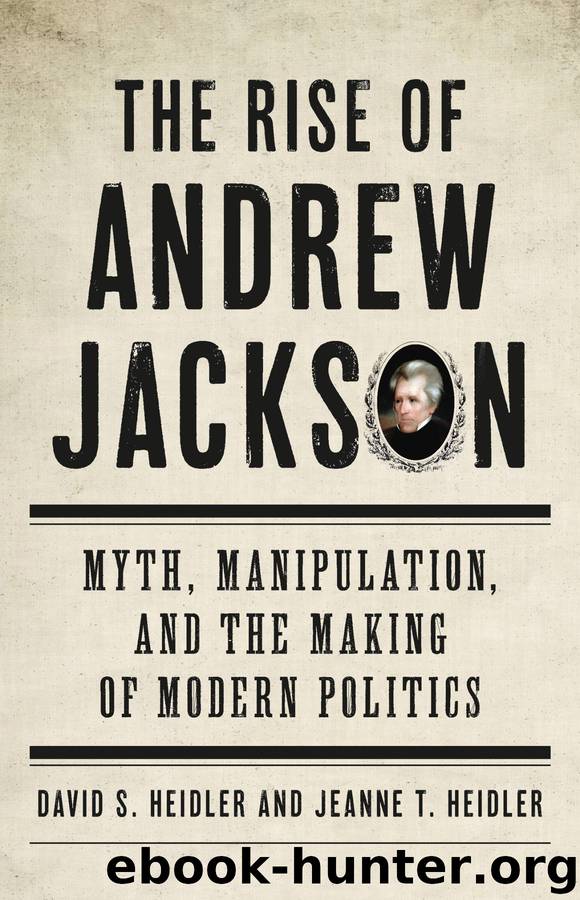The Rise of Andrew Jackson by David S. Heidler

Author:David S. Heidler
Language: eng
Format: epub
Publisher: Basic Books
Published: 2018-10-22T16:00:00+00:00
Mr. Speaker: The Tellers of the votes at this table have proceeded to count the ballots contained in the box before them. The result they find to be, that there are
For John Quincy Adams, of Massachusetts, 13 votes
For Andrew Jackson, of Tennessee, 7 votes
For William H. Crawford, of Georgia, 4 votes37
At the other table, John Randolph rose and piped his concurrence with the tally in his shrill voice, varying Webster’s words only by saying “states” rather than “votes.” Their counting had taken a mere half hour, and the widely held expectation that the first ballot would be only the beginning of a long process had lulled everyone into a kind of torpor. When Henry Clay announced that Adams was the president-elect, the realization that it was all over had an “electric” effect. A smattering of applause rippled through the gallery. Low hisses answered. It was hardly a raucous response, but Clay was taking no chances. He slammed down his gavel and ordered the gallery cleared. Andrew Jackson Donelson, who had stationed himself in it from the start, was already shouldering his way through the crowd. He raced to Gadsby’s with the news.38
The House adjourned. Stephen Van Rensselaer saw Louis McLane leaving the building and walked briskly to catch up with him, but McLane sprinted from the building, jumped in a crowded carriage, and returned to their boardinghouse. Back in his room, he heard Van Rensselaer’s heavy tread on the steps and a tap on his door. The patroon entered. “Forgive me, McLane,” he said softly, holding out his hand. McLane turned away. “Ask your own conscience, General and not me,” Louis McLane said flatly.39
North Carolina senator Nathaniel Macon found William H. Crawford seated comfortably in his parlor, a cheerful fire warming the room against the blowing snow outside. Macon was “a solid, farmer-like man,” a sage of the Senate and a keen observer of changing times. The campaign season had unfolded in ways that troubled him, marking the emergence of “new parties… not founded like the old, on the construction of the Constitution.” Instead, they would be collections of self-interest, “the followers of men [rather] than principles.” As it did every visitor, Crawford’s appearance saddened him, particularly because of the news he carried. He wondered why Crawford seemed surprised to hear it.40
Other supporters drifted into the parlor that night, including Martin Van Buren and Louis McLane, still bitter about Van Rensselaer’s “miserable wavering.” Crawford’s wife was curt with Van Buren, but he overlooked it and sat subdued, joining the others in a gathering that had the mood of a wake. The only cheerful person in the room was the one playing whist and occasionally cracking a joke. Crawford’s dear Caroline, the daughter who had become his understanding ear as well as his voice to the world, always laughed appreciatively. It made William H. Crawford smile before he went back to squinting at his cards.41
Download
This site does not store any files on its server. We only index and link to content provided by other sites. Please contact the content providers to delete copyright contents if any and email us, we'll remove relevant links or contents immediately.
| Anthropology | Archaeology |
| Philosophy | Politics & Government |
| Social Sciences | Sociology |
| Women's Studies |
The Secret History by Donna Tartt(16681)
The Social Justice Warrior Handbook by Lisa De Pasquale(11496)
Thirteen Reasons Why by Jay Asher(7810)
This Is How You Lose Her by Junot Diaz(5805)
Weapons of Math Destruction by Cathy O'Neil(5058)
Zero to One by Peter Thiel(4841)
The Myth of the Strong Leader by Archie Brown(4797)
Promise Me, Dad by Joe Biden(4462)
Beartown by Fredrik Backman(4447)
How Democracies Die by Steven Levitsky & Daniel Ziblatt(4430)
Stone's Rules by Roger Stone(4427)
The Fire Next Time by James Baldwin(4357)
100 Deadly Skills by Clint Emerson(4095)
A Higher Loyalty: Truth, Lies, and Leadership by James Comey(4045)
Rise and Kill First by Ronen Bergman(4029)
The David Icke Guide to the Global Conspiracy (and how to end it) by David Icke(3900)
The Farm by Tom Rob Smith(3884)
Secrecy World by Jake Bernstein(3793)
The Doomsday Machine by Daniel Ellsberg(3743)
